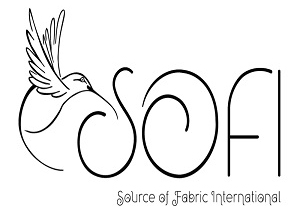When it comes to sourcing fabric, finding the right wholesale companies can make all the difference for your business. Whether you’re a designer, a small boutique owner, or a large manufacturer, the quality and variety of fabric you choose can significantly impact your products. With countless options available, it’s essential to know what to look for in a wholesale fabric supplier.
Wholesale fabric companies offer a treasure trove of materials, from luxurious silks to durable cottons, catering to diverse needs. Understanding the benefits of working with these suppliers can help you streamline your production process while maximizing your profit margins. In this article, you’ll discover key factors to consider when selecting a wholesale fabric company, including pricing, quality, and customer service. Get ready to elevate your fabric sourcing game and find the perfect partner for your creative endeavors.
Understanding Fabric Companies Wholesale
Understanding wholesale fabric companies involves recognizing their role in the fashion industry. These companies provide bulk fabric at a lower cost than retail, allowing you to maximize your profit margins. Knowing the core aspects of these suppliers enhances your ability to choose the right one for your business needs.
Key Factors in Choosing Wholesale Fabric Companies
- Pricing: Evaluate multiple suppliers to compare prices. Obtain samples to assess quality and gauge the materials against their pricing. Discounts and bulk order pricing can significantly affect your budget.
- Quality: Inspect fabrics before making a commitment. Look for lasting materials with good texture. Ensure they meet the standards required for the garments you plan to produce. High-quality fabric can lead to better end products.
- Variety: Assess the range of fabrics available. A wider selection provides greater creative options. Seek suppliers that offer various fabrics such as cotton, silk, or polyester. Different projects may call for different types of fabric.
- Customer Service: Reliable customer service greatly impacts your experience. Choose a company that responds quickly to inquiries and addresses concerns. Positive interactions build long-term relationships, essential in the fabric sourcing process.
- Delivery Times: Inquire about shipping times and reliability. Timely delivery affects your production schedule. Choose suppliers known for their efficiency to avoid disruptions in your workflow.
- Return Policies: Familiarize yourself with the supplier’s return policy. Ensure they accept returns on defective or unsatisfactory products. Clear return policies provide reassurance when making substantial purchases.
Steps to Establish a Relationship with Wholesale Fabric Companies
- Research: Investigate various companies. Utilize online resources, industry directories, and trade shows. Gathering information allows you to make informed decisions.
- Contact Suppliers: Reach out to suppliers for more details about their offerings. Ask questions regarding pricing, fabrics, and order procedures.
- Request Samples: Obtain sample swatches to examine materials firsthand. Physical samples provide insight into the quality and feel of fabrics.
- Place Trial Orders: Start with a small order to assess the supplier’s reliability. Evaluate the entire process from ordering to delivery before committing to larger orders.
- Provide Feedback: Offer feedback on your experience. Suppliers often appreciate constructive input, leading to improvements and better service in the future.
Understanding wholesale fabric companies allows you to select optimal sources for your fabric needs. Following these steps ensures a successful partnership with suppliers, enhancing your business’s fabric sourcing strategy.
Benefits of Buying Wholesale Fabric
Buying wholesale fabric provides significant advantages for your business. It allows you to enhance your production efficiency and improve your bottom line.
Cost Savings
Cost Savings stand as one of the primary benefits of purchasing wholesale fabric. When you buy in bulk, you access lower prices per yard compared to retail options. For example, retail prices can be up to 30% higher than wholesale. This reduction in cost allows you to allocate funds to other business areas, such as marketing or design. Moreover, many wholesale fabric companies offer discounts for larger orders, incentivizing you to stock up on materials. This strategic investment can lead to improved profit margins when the finished products reach the market.
Variety of Choices
Variety of Choices offers another compelling reason to buy wholesale fabric. Wholesale suppliers provide an extensive range of fabric types, patterns, colors, and textures. For instance, you can find cotton, linen, silk, and synthetic blends all in one place. This broad selection enables you to source materials that perfectly match your design vision. Access to diverse fabric options reduces the time spent searching from multiple retailers for specific needs, streamlining your purchasing process. You can experiment with new styles and trends, allowing your designs to stand out in a competitive market.
Bulk Purchasing Advantages
Bulk Purchasing Advantages enhance your fabric sourcing strategy. By ordering larger quantities, you secure consistent quality across your products. Suppliers typically manufacture fabric in large rolls, ensuring uniformity in color and texture. This aspect is crucial for maintaining brand standards when producing collections. Additionally, ordering in bulk minimizes the frequency of orders, saving you time and effort. You can avoid constant reordering and focus on other essential business operations. Bulk buying also ensures you have enough inventory on hand to meet customer demands, keeping your production schedule timely and efficient.
Finding Reliable Fabric Companies
Finding reliable fabric companies involves a few practical steps. Ensuring you partner with trustworthy suppliers is essential for maintaining product quality and business integrity.
Researching Online
Researching online provides access to numerous fabric companies. Utilize search engines to find suppliers that fit your needs. Focus on business directories and industry-specific websites.
- Identify keywords such as “wholesale fabric suppliers” or “fabric distributors.”
- Examine supplier websites to assess their offerings and policies.
- Review their catalogs for fabric types, colors, and textures to fit your product line.
- Check their location for logistical ease with shipping and delivery.
Consider integrating social media platforms to expand search results. Many fabric companies use platforms like Instagram and Pinterest to showcase their offerings. This also allows you to view customer interactions and product presentations align with your brand vision.
Reading Reviews and Testimonials
Reading reviews and testimonials assists in evaluating fabric companies. Look for both positive and negative feedback to gain a balanced perspective.
- Search for reviews on third-party websites to ensure authenticity.
- Pay attention to comments about fabric quality, pricing, and customer service.
- Explore forums or groups related to the fabric industry for unbiased opinions from other users.
- Analyze testimonials on supplier websites cautiously; prioritize independent sources for reliability.
Contacts that former or current customers provide useful insights into potential challenges. Customer ratings can guide your decision about which companies to pursue for wholesale fabric.
Networking with Other Retailers
Networking with other retailers creates valuable insights about reliable fabric companies. Engage in fabric trade shows, local markets, and online forums.
- Attend industry events to meet suppliers and fellow retailers.
- Join online groups focused on fabric sourcing for shared experiences and recommendations.
- Discuss specific needs with peers to gather firsthand suggestions on suppliers.
- Exchange contact information with trusted retailers for private referrals.
Building these connections encourages the sharing of experiences. Keeping a list of recommended suppliers enhances your sourcing strategy for future fabric purchases. Connecting with other businesses also offers insights into navigating challenges in the fabric industry.
Evaluating Fabric Quality
Evaluating fabric quality involves understanding the various factors that contribute to durability, appearance, and usability. Focus on identifying the types of fabrics, checking for relevant certifications, and requesting samples from suppliers.
Types of Fabrics to Consider
Identify different categories of fabrics when evaluating options. Natural fabrics like cotton and linen provide breathability and comfort. Synthetic fabrics such as polyester and nylon offer durability and stain resistance. Blends, which combine natural and synthetic fibers, often deliver improved functionality. Consider specific uses for each fabric type, such as lightweight cotton for summer garments, sturdy canvas for bags, and stretchy spandex for activewear. Prioritize fabrics suited for your products, assessing their performance characteristics, look, and feel. Compare fabric weights alongside weave patterns, as these elements can significantly affect the overall quality.
Checking for Certifications
Ensure fabric quality by checking for industry certifications. OEKO-TEX Standard 100 certifies that textiles are free from harmful substances, promoting safe use. Global Organic Textile Standard (GOTS) guarantees that organic fibers meet social and environmental criteria. Assessing certifications can help ensure a commitment to sustainability and ethical production practices. Request documentation from suppliers to verify compliance with these standards. Consider certifications like FSC (Forest Stewardship Council) for sustainable wood-based fibers, such as rayon or modal. Prioritize suppliers who uphold standards valued by your business and customer base.
Requesting Samples
Requesting fabric samples proves vital in evaluating quality before making bulk orders. Specify fabric types you consider, including colors and patterns. Samples allow you to inspect physical attributes like weight, texture, and appearance. Examine how fabrics behave under various conditions, such as washing and stretching. Testing samples helps reveal colorfastness and overall durability. Evaluate how fabrics hold up during everyday wear. Confirm that suppliers provide reliable and timely delivery of samples, ensuring no disruptions in your sourcing process. Consider requesting multiple samples to compare options effectively.
Placing Orders with Wholesale Companies
Placing orders with wholesale fabric companies requires attention to several key factors to ensure a smooth purchasing experience.
Minimum Order Quantities
Minimum order quantities (MOQs) represent the smallest amount you can order from a supplier. Understand the MOQs set by each company as these can vary widely. Some suppliers may require an MOQ of 25 yards while others might have an MOQ of 100 yards or more. Determine project needs before selecting a supplier. Placing a trial order can help gauge supplier performance and fabric quality without committing to large quantities. Examining different suppliers in terms of their MOQs creates options for different budgets and production requirements. Always clarify MOQs before finalizing your order to avoid surprises.
Payment Options
Payment options vary among wholesale fabric companies. Familiarize yourself with the payment methods available to ensure secure transactions. Most suppliers accept credit cards, bank transfers, and sometimes PayPal. Determine whether the supplier requires a deposit or full payment upon ordering. Be aware of any surcharges for specific payment methods that might apply. Some suppliers also offer terms, allowing you to pay after delivery. Discussing payment terms early builds trust and helps manage cash flow. Always keep track of invoices and payment confirmations for future reference.
Shipping and Delivery Considerations
Shipping and delivery factors significantly impact order fulfillment. Understand the shipping options offered by your supplier. Common methods include standard shipping, expedited shipping, or freight for larger orders. Confirm the estimated delivery timeline to align with your production schedule. Discuss shipping costs upfront to avoid unexpected expenses. Some suppliers offer free shipping over a certain order amount, which could be beneficial. Always provide clear delivery information to ensure your order reaches the correct location. Tracking shipment status after the order is placed enables timely follow-ups if needed.
Negotiating with Fabric Suppliers
Negotiating with fabric suppliers is crucial for achieving favorable terms and ensuring a successful partnership. Understand key factors that impact negotiations.
Understanding Pricing Structures
Pricing structures vary among fabric suppliers. Prices often depend on fabric type, order volume, and supplier policies. Request a clear breakdown of costs, which may include base prices, shipping fees, and any discounts for bulk purchases. Compare quotes from multiple suppliers to gauge average pricing in the market. Prices may drop significantly when placing larger orders, so discussing your expected quantities can lead to better rates. Verify whether prices include taxes or extra fees to avoid surprises. Always be prepared to justify your request for lower prices by referencing competing offers or your potential for future business with the supplier.
Discussing Payment Terms
Payment terms play a significant role in negotiations with fabric suppliers. Discuss options such as upfront payments, net terms, or payment upon delivery. Evaluate what aligns best with your cash flow situation. Negotiate for longer payment terms if necessary, especially if you plan to resell the fabric first. Some suppliers may offer discounts for early payments, which can reduce overall costs. Clarify any transaction fees associated with payment methods to avoid unexpected costs. Understanding these terms not only protects your business but also fosters transparent communication, reinforcing a positive relationship with suppliers.
Building Long-term Relationships
Building long-term relationships with fabric suppliers enhances your sourcing strategy. Approach negotiations with a mindset focused on collaboration rather than confrontation. Regular communication establishes trust and allows you to address any issues proactively. Recognize suppliers’ needs and constraints to create mutually beneficial arrangements. Offer feedback on their products and services, as this shows investment in the partnership and may lead to better pricing or service in the future. Additionally, show loyalty by placing consistent orders, which can lead to easier negotiations down the line. Strong relationships can translate into exclusive access to new fabrics or priority during busy seasons.
Troubleshooting Common Issues
Addressing common issues can enhance your experience with wholesale fabric suppliers. Here are solutions to some frequently encountered problems.
Dealing with Fabric Defects
Fabric defects can impact quality and customer satisfaction. Inspect each batch upon arrival for flaws such as tears, discoloration, or inconsistencies. Request replacements for defective rolls or pieces that do not meet quality standards. Document defects with photographs and detailed notes to support your claims. Maintain clear communication with your supplier to expedite the resolution process. Always refer to the supplier’s return policy to understand the timeframes and procedures for returning defective fabric. Establish a checklist for quality assurance to prevent future issues by identifying recurring defects and addressing them promptly.
Handling Delayed Shipments
Delayed shipments can disrupt production schedules and lead to lost sales. Contact your fabric supplier immediately to inquire about the status of your order. Track the shipment using provided tracking numbers and verify shipping details. Understand the reasons for delays, whether due to supply chain issues or inaccurate information. Develop contingency plans by sourcing alternative suppliers or keeping extra inventory on hand to mitigate the effects of delays. Maintain open communication with customers regarding expected delivery times and delays to manage their expectations. Identify systematic problems or recurring issues with a supplier and seek alternatives if delays become a pattern.
Resolving Payment Disputes
Payment disputes can complicate your relationships with suppliers. Keep detailed records of all transactions, including invoices, receipts, and communications. Reach out to your supplier to discuss discrepancies or issues with payments. Provide clear documentation to support your claims, making it easier to resolve misunderstandings. If disputes persist, consider mediation or third-party arbitration to find a resolution. Establish clear payment terms in your initial agreements, including deadlines and methods. Regularly review your payment processes to ensure adherence and avoid future disputes, fostering a smoother experience with your fabric suppliers.
Conclusion
Finding the right wholesale fabric supplier can transform your business. By prioritizing quality pricing and customer service you can enhance your product offerings and maximize profit margins. Remember to evaluate suppliers carefully and build strong relationships to ensure a reliable fabric sourcing experience.
Utilizing the strategies discussed can streamline your purchasing process and help you make informed decisions. As you navigate the world of wholesale fabrics stay proactive in addressing any challenges that arise. With the right approach you’ll not only secure the best materials but also foster partnerships that support your business growth.
Frequently Asked Questions
What are wholesale fabric suppliers?
Wholesale fabric suppliers sell fabrics in large quantities at lower prices compared to retail. They cater to businesses in the fashion industry, providing a variety of materials that can help designers and manufacturers maximize their profit margins and improve production efficiency.
Why is fabric quality important for businesses?
Fabric quality directly impacts the final product, affecting durability, appearance, and customer satisfaction. High-quality fabrics can enhance a brand’s reputation, leading to repeat purchases and increased sales, making it essential for businesses to prioritize quality when selecting suppliers.
How can I evaluate a wholesale fabric supplier?
Evaluate a supplier by examining their pricing, fabric quality, available material variety, customer service, delivery times, and return policies. Additionally, requesting samples and reading reviews can provide insights into their reliability and product offerings.
What benefits do wholesale fabric purchases offer?
Purchasing fabrics wholesale can lead to significant cost savings, with prices often 30% lower than retail. This allows businesses to allocate more resources to areas like marketing and design while ensuring they have a variety of fabric choices for their products.
How do I ensure I’m choosing the right fabric?
To ensure you select the right fabric, consider factors such as durability, texture, and usability. Familiarize yourself with different fabric types (natural, synthetic, blends) and assess them through samples. Checking for industry certifications can also indicate quality and sustainability.
What are minimum order quantities (MOQs)?
Minimum order quantities (MOQs) refer to the smallest amount of fabric a supplier requires you to purchase at once. MOQs can vary among suppliers, so it’s important to clarify these details before placing your order to avoid unexpected costs.
How can I negotiate with fabric suppliers?
Negotiating with suppliers involves discussing pricing structures, payment terms, and potential discounts based on order volume. Be sure to request clear breakdowns of costs and maintain an open line of communication to build a mutually beneficial relationship.
What should I do if I experience issues with suppliers?
If issues arise, such as fabric defects or delayed shipments, maintain clear communication with the supplier and inspect the fabric upon arrival. Keeping detailed records of transactions will help resolve disputes and improve your sourcing experience in the future.


